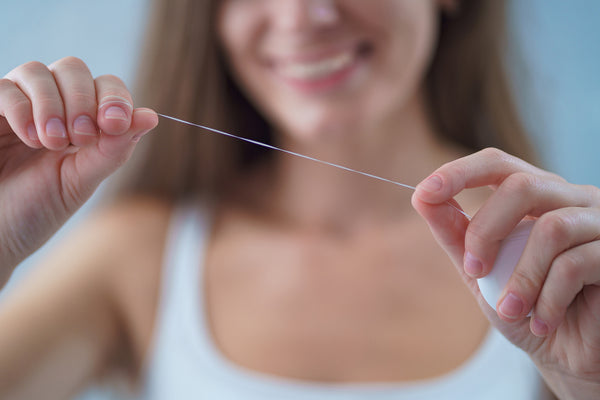How to Floss when you have Braces

Flossing is extremely important in maintaining our oral health, whether you have braces fitted or not, it is one of the vital steps in ensuring that your teeth and gums stay strong and healthy. Many dentists will recommend flossing daily, especially after eating as food particles can become lodged between the teeth and create an environment for bacteria to grow, which eventually leads to cavities, tooth decay, and in some cases, tooth loss.
If you are well-practised in flossing and taking care of your oral health but are finding it difficult to know where to begin when you have braces fitted, then read ahead for useful information to help you on your way.
Why is Flossing so Important to our Oral Health?
As mentioned previously, flossing is a vital step after brushing your teeth, in removing food particles between your teeth that brushing may have missed and removing plaque from below the gumline. Not flossing your teeth increases your risk of bad breath and plaque build-up which can erode your tooth enamel and develop into tartar, causing teeth discolouration, cavities, soreness, puffiness, and redness of gums, and ultimately gum disease which is a major factor in tooth loss.
The Pros and Cons of Traditional Flossing when you have Braces
Traditionally, flossing involves thin filaments of string that would be used to push between your teeth which would dislodge stubborn bits of food, however, it’s not difficult to see why this may be a problem with braces.
Using this manual flossing method is an efficient way to remove food debris from between the teeth, especially if the string is waxed as it enables the string to pass through the interdental spaces without much effort. It also mostly comes in a small, transportable tub which makes it easy to carry around and use when you’re on the go.
The difficulty when you have fixed braces is trying to pass the string through each bracket and wire attached to your teeth. It is almost impossible to floss with string without tampering with your brace bracket or wire, and so you run the risk of possibly damaging your braces by doing so. Traditional flossing also involves purely manual work, and sometimes too much pressure can be applied, causing your gums to bleed. This continuous disturbance to your gums can also lead to swelling which can sometimes be irritating and painful.
2 Easy Ways to Floss with Braces
Flossing with braces is even more important as braces can be a breeding ground for bacteria to build up on food particles and plaque that hide between your teeth, brackets, and wires. Flossing becomes even more important for your oral health to decrease the chance of oral-related diseases. It’s important to know how to floss with your braces and what options are available to you.
Flossettes
A flossettes resembles a horse shoe, it is a flexible piece of plastic that assists in passing dental floss around fixed brackets and behind wires. The flossette is ready made and single use, it can be pushed under the orthodontic wire, between your teeth, and repeated for each interdental space. An excellent way of flossing your teeth whilst having orthodontic appliances fitted.
Water Flosser
This is a hand-held electronic device that shoots a concentrated stream of water between your teeth, dislodging food debris and removing plaque and bacteria. Also known as an oral irrigator, this powerful device can replace traditional forms of flossing and prove beneficial when you have fixed braces. By using a water flosser there is no risk of bleeding gums, unlike traditional flossing methods and the machine does all the work for you so there is minimal manual movement involved. Water flossers can be pricey though and the water jets can sometimes be less effective at removing plaque than other methods.
Speak to your Orthodontist About Flossing
It is important to discuss methods of flossing with your orthodontist before leaving your first appointment, as often you won’t know which method will work best for you until you have tried them. Your orthodontist will be only too happy to recommend their chosen methods and what will work best in keeping your teeth and gums healthy. Braces can make flossing more challenging but with the variety of options available, it shouldn’t be too difficult to find the method that suits you.
Northenden House Orthodontics: How Your Local Orthodontist in Manchester Can Help
At Northenden House Orthodontics, we understand what undertaking orthodontic treatment brings with it, the excitement alongside the worries and questions, but we have been a leading orthodontist in Manchester and the surrounding areas for over 40 years, so know only too well what you will be feeling.
Our top priority is to provide all our patients with the highest quality care and to provide orthodontic treatment in a comfortable, friendly environment to help you to achieve the smile you deserve.
To find out more, contact our consultant-led practice, orthodontist in Manchester.
- Mohammad Malik

